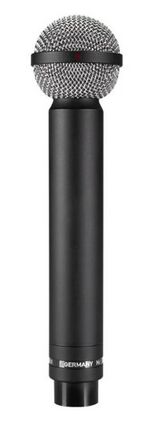Engineering:Beyerdynamic M 160

The Beyerdynamic M 160, sometimes referred to as Beyer M160, is a German hypercardioid ribbon microphone used for speech in broadcasting and for music in live concerts and the recording studio. Introduced in 1957 by Beyerdynamic, the M 160 is based on a rugged dual-ribbon transducer element with rare earth neodymium magnets to reduce the size. The two 15-millimeter (0.59 in) ribbons combine to yield a highly directional pickup pattern. The ribbon assembly is turned 90 degrees away from the usual configuration to make the M 160 an end-address model; the similar M 130 model is a side-address microphone with a figure-8 pickup pattern.[1][2]
The M 160 is known for its ability to soften the harsh characteristics of strident sound sources.[3] David Bowie sang into an M 160 for most of the songs on Young Americans. [4] Engineer Andy Johns used a distant pair of M 160s (along with other processing) on John Bonham's drum kit for the Led Zeppelin version of "When the Levee Breaks".[5] The M 160 is commonly used on guitar amplifiers,[6] for instance, engineer Eddie Kramer recorded both the voice and the guitar of Jimi Hendrix on M 160s, starting in 1967 halfway through the sessions for Are You Experienced.[7] Producer Phil Ramone used an M 160 to record Billy Joel's voice on every album from 1977 to 1986.[8] The main electric guitar riff of Michael Jackson's "Black or White" was recorded with an M 160 in 1989 by Bill Bottrell.[9]
Still in production after more than six decades, the M 160 was inducted into the TEC Awards Technology Hall of Fame in 2019.[7]
References
- ↑ Simmons, Greg (November 27, 2020). "Ribbon Microphones". https://www.audiotechnology.com/regulars/ribbon-microphones.
- ↑ Huber, David Miles; Runstein, Robert E. (2012). Modern Recording Techniques. CRC Press. p. 114. ISBN 9781136117985. https://books.google.com/books?id=y9d5AgAAQBAJ&pg=PA114.
- ↑ "Mixdown's Picks: Beyerdynamic M160". https://mixdownmag.com.au/reviews/studio/mixdowns-picks-beyerdynamic-m160/.
- ↑ Hunter, Dave (2012). The Home Recording Handbook. Rowman & Littlefield. p. 274. ISBN 9781476855851. https://books.google.com/books?id=zs-GDwAAQBAJ&pg=PT274.
- ↑ Welch, Chris (October 31, 2013). "Andy Johns on the secrets behind the Led Zeppelin IV sessions". https://www.musicradar.com/news/drums/andy-johns-on-the-secrets-behind-the-led-zeppelin-iv-sessions-586533.
- ↑ Owsinski, Bobby (2005). The Recording Engineer's Handbook. Hal Leonard. p. 43. ISBN 9781932929003. https://books.google.com/books?id=Emke4izOwVsC&pg=PA43.
- ↑ 7.0 7.1 "Beyerdynamic M 160". https://www.tecawards.org/node/1150.
- ↑ Ramone, Phil (2007). Making Records: The Scenes Behind the Music. Hachette. p. 199. ISBN 9781401388294.
- ↑ Buskin, Richard (August 2004). "Classic Tracks: Michael Jackson 'Black Or White'". Sound on Sound. https://www.soundonsound.com/techniques/classic-tracks-michael-jackson-black-or-white. Retrieved April 19, 2022.
External links
- Manufacturer's webpage of the Beyerdynamic M 160 (US English)
- Review of the M 160 with listening examples by Podcastage
